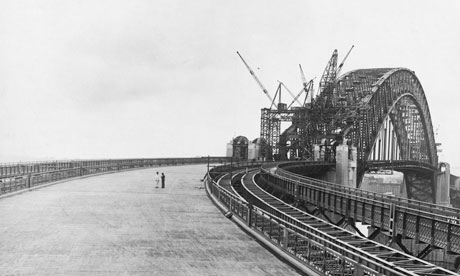
It is widely accepted that trade is an engine for economic growth and development, and as a result donors have long invested in trade-related infrastructure – roads, storage facilities, telecoms and energy generation and supply.
But bricks-and-mortar on their own have yet to end poverty anywhere. In fact large construction projects are often hotbeds for corruption – the American Society of Civil Engineers estimate that $340bn (£217bn) is lost to corruption in the construction industry worldwide every year.
Beyond physical infrastructure, aid for trade is intended to enable developing countries to acquire the economic tools they need to expand their trade, including developing their policy and regulatory environments.
But it seems with one hand donor countries give and with the other they take away. A review of the progress made to meet MDG target 8.A (to develop an open, rule-based, predictable, non-discriminatory trading and financial system) shows that "despite the pledges by G20 members to resist protectionist measures initiated as a result of the global financial crisis, only a small percentage of trade restrictions introduced since the end of 2008 have been eliminated. The protectionist measures taken so far have affected almost 3% of global trade."
And as research by Inge Ropke and others argue, not all trading systems are created equal. The Danish academic's assessment of the 'free trade dogma' found that "the trading system is not something inherently good, which should be defended in all cases. Especially, the developing countries' benefits from trade have been very dubious."
So beyond simply investing in the infrastructure to facilitate trade how can policymakers, and those they consult on trade development, ensure that investments deliver value for money and result in gains that are both sustainable and contribute to development outcomes?
Trade facilitation is supposed to achieve many things – from supporting governments to take measures to diversify the economy to supporting business associations and marginalised groups, and helping to improve technical and logistical facilities in ports and laboratories.
On Thursday 22 August, we bring a panel of experts together to consider how all of these can be done well. Join us at 1pm BST in the comment threads below.
The live chat is not video or audio-enabled but will take place in the comments section (below). To join the panel or give your views ahead of the chat, email globaldevpros@theguardian.com. Follow our tweets on Thursday using the hashtag #globaldevlive
Panel
Steve Brady, director – customs and trade facilitation, Crown Agents, Sutton, United Kingdom. @crownagents
Steve helps governments improve the quality of their public finance management and international trade administration. He has worked and traveled extensively in Africa and Asia and was formerly country director of Crown Agents' operations in Nigeria, Uganda and Japan.
Frans Lammersen, principal administrator, OECD, Paris, France. @OECDdev
Frans manages the OECD's contribution to the World Trade Organisation's Aid for Trade Initiative. In the Development Co-operation Directorate that services the Development Assistance Committee (DAC) he is responsible for the committee's work on trade and development.
Harriet Lamb, CEO, Fairtrade International, Bonn, Germany. @HarrietLambFT
Harriet was previously CEO of the UK Fairtrade Foundation, from 2001 - 2012. She's worked with cooperatives in India, and campaigned on international development issues including aid, successfully undertaking the Pergau dam case at the World Development Movement.
Collins Apuoyo, sector leader – agriculture, SNV Netherlands, Harare, Zimbabwe. @ApuoyoSNV
Collins has worked for over 22 years experience, including time with DfID Kenya as private sector development advisor. At SNV, Collins works to revitalise agricultural value chains that provide the highest potential for smallholder and 'bottom of pyramid' participation.
Debapriya Bhattacharya, distinguished fellow, Centre for Policy Dialogue (CPD), Dhaka, Bangladesh
Debapriya is a macro-economist and public policy analyst. He is a former ambassador and permanent representative of Bangladesh to the WTO and UN offices of Geneva and Vienna. He has also been the special advisor on least developed countries to the secretary general of UNCTAD.
Anders Aeroe, director, International Trade Centre (ITC), Geneva, Switzerland. @AndersAeroe
Anders is director of the division of market development. His work has focused on the interrelated topics of trade facilitation, industrial transformation and sustainable development at company, organisational and policy levels.
Junior Lodge, director, ACP multilateral trading system programme, Brussels, Belgium
Junior is a former Jamaican public servant, currently directing an EU-funded project that supports African Caribbean and Pacific countries on WTO issues. He previously coordinated the Cariforum technical negotiations of both Doha Development Agenda and Economic Partnership Agreement.
Arjan de Haan, programme leader, International Development Research Centre, Ottawa, Canada. @IDRC_CRDI
Arjan's work focuses on public policy and poverty in Asia. He leads the IDRC programme 'supporting inclusive growth', managing a team of 10 specialists in Ottawa and regional offices. He's previously worked at DfID and managed the Poverty Research Unit at the University of Sussex.
Aaron Cosbey, senior advisor, trade and investment, International Institute for Sustainable Development, Rossland, BC, Canada. @IISD_news
Aaron is a development economist expert in the law and economics of sustainable development. He directs the Institute's suite of work on trade, investment and climate change, as well as the Institute's work in the area of green industrial policy.

